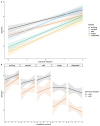Between Joy and Sympathy: Smiling and Sad Recipient Faces Increase Prosocial Behavior in the Dictator Game
- PMID: 34200370
- PMCID: PMC8201160
- DOI: 10.3390/ijerph18116172
Between Joy and Sympathy: Smiling and Sad Recipient Faces Increase Prosocial Behavior in the Dictator Game
Abstract
In human interactions, the facial expression of a bargaining partner may contain relevant information that affects prosocial decisions. We were interested in whether facial expressions of the recipient in the dictator game influence dictators' behavior. To test this, we conducted an online study (n = 106) based on a modified version of a dictator game. The dictators allocated money between themselves and another person (recipient), who had no possibility to respond to the dictator. Importantly, before the allocation decision, the dictator was presented with the facial expression of the recipient (angry, disgusted, sad, smiling, or neutral). The results showed that dictators sent more money to recipients with sad or smiling facial expressions and less to recipients with angry or disgusted facial expressions compared with a neutral facial expression. Moreover, based on the sequential analysis of the decision and the interaction partner in the preceding trial, we found that decision-making depends upon previous interactions.
Keywords: dictator game; emotional influence; facial expression; social decision-making.
Conflict of interest statement
The authors declare no conflict of interest.
Figures


References
-
- Neumann J., Morgenstern O. Game Theory and Economic Behavior. John Wiley and Sons; New York, NY, USA: 1944.
-
- Forsythe R., Horowitz J.L., Savin N., Sefton M. Fairness in Simple Bargaining Experiments. Games Econ. Behav. 1994;6:347–369. doi: 10.1006/game.1994.1021. - DOI
-
- Batson C.D. The Altruism Question: Toward a Social Psychological Answer. Erlbaum; Hillsdale, NJ, USA: 1991.
Publication types
MeSH terms
LinkOut - more resources
Full Text Sources

